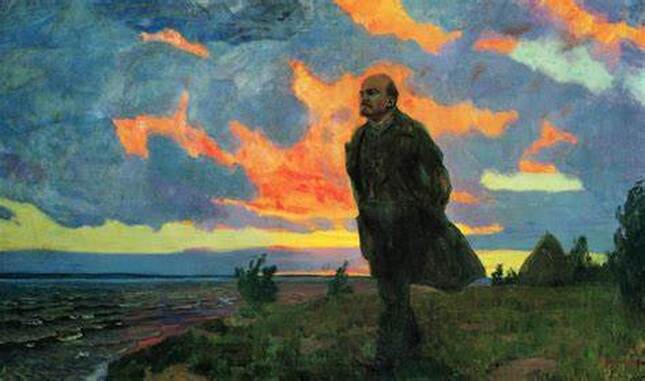|
12/8/2021 V. I. Lenin - Materialism & Empirio-Criticism. Commentary and Analysis (10/23). By: Thomas RigginsRead NowChapter Two : Section Five: "Absolute and Relative Truth, or the Eclecticism of Engels as Discovered by A. Bogdanov This great discovery was made, says Lenin, in the preface to Book III of Bogdanov's Empirio-monism. Bogdanov thinks he is ridiculing Engels when the latter gives as examples of "eternal truths" such statements as "Napoleon died on May 5, 1821" or "Paris is in France." To Bogdanov this is too trivial for words. "What sort of 'truth' is that?", he asks, "And what is there eternal about it? The recording of a single correlation, which perhaps even has no longer any real significance for our generation, cannot serve as the starting-point for any activity and leads no-where." For some reason Bogdanov calls such "truths" eclectic, as if Engels is just uncritically adopting them from all different forms of materialism. Of course the examples given by Engels are "trivial", but they are given to make a point, which is that there are many examples of objective and eternal truths all around us and that idealist philosophers are just being foolish when they try to make a big mystery about "truth." Bogdanov's objections are just "turgid nonsense" according to Lenin. "To be a materialist," Lenin writes, "is to acknowledge objective truth, which is revealed to us by our sense-organs. To acknowledge objective truth, i.e., truth not dependent upon man and mankind, is, in one way or another, to recognise absolute truth." What we have to do is get away from these trivial criticisms and examine dialectically the distinction that Engels was trying to make between relative and absolute truth in his criticism of Dühring's philosophy. By ignoring the context of Engels' argument Bogdanov only reveals his own incompetence. By thinking dialectically Engels arrives at a concept of absolute truth that grows out of relative truth. Each one of us as an individual has a part of the truth, relative truth, but absolute truth is the whole which gradually reveals itself, but only partially at any one time. "For Bogdanov (as for all Machists)," Lenin writes, "recognition of the relativity of our knowledge excludes even the least admission of absolute truth. For Engels absolute truth is compounded from relative truths. Bogdanov is a relativist; Engels is a dialectician." Absolute truth (the reality behind the world of our sensations) is built out of the relative truths we gain from experience. Towards the end of this section Lenin says, "Dialectics -- as Hegel in his time explained -- contains an element of relativism, of negation, of skepticism, but is not reducible to relativism." What is at issue, and which Bogdanov and the other Machists fail to see, is "the correspondence between the consciousness which reflects nature and the nature which is reflected by consciousness." This is something that Marx and Engels understood (and Dietzgen and Feuerbach as well). Bogdanov and the Machists, under the guise of modern science, are just repeating "ancient trash." SECTION SIX: "The Criterion of Practice in the Theory of Knowledge" "'The dispute over the reality or non-reality of thinking which is isolated from from practice is a purely scholastic question,' says Marx in his second Thesis on Feuerbach,'' Lenin points out, and Engels repeats: "The success of our action proves the conformity of our perceptions with the objective nature of the things perceived." And what does Mach have to say about the criterion of practice? According to Lenin Mach, in The Analysis of Sensations, makes a distinction between theory and practice. Mach: "Physiologically we remain egoists and materialists with the same constancy as we forever see the sun rising again. But theoretically this view cannot be adhered to." This is supposed to be the newest scientific viewpoint (1908). I won't go into the newest viewpoints (2008), but will remark that the battle continues! But it is an old battle. A hundred years before Lenin it was raging, Fichte, and two thousand years before that with the Greeks as well as in other philosophical traditions. "Of course, we must not forget that the criterion of practice can never, in the nature of things, either confirm or refute any human idea completely. This criterion too is sufficiently 'indefinite' not to allow human knowledge to become "absolute", but at the same time it is sufficiently definite to wage a ruthless fight on all varieties of idealism and agnosticism." Up Next: sections 1 and 2 of Chapter Three, “THE THEORY OF KNOWLEDGE OF DIALECTICAL MATERIALISM AND OF EMPIRIO-CRITICISM III” AuthorThomas Riggins is a retired philosophy teacher (NYU, The New School of Social Research, among others) who received a PhD from the CUNY Graduate Center (1983). He has been active in the civil rights and peace movements since the 1960s when he was chairman of the Young People's Socialist League at Florida State University and also worked for CORE in voter registration in north Florida (Leon County). He has written for many online publications such as People's World and Political Affairs where he was an associate editor. He also served on the board of the Bertrand Russell Society and was president of the Corliss Lamont chapter in New York City of the American Humanist Association.
0 Comments
Leave a Reply. |
Details
Archives
January 2022
Categories |


 RSS Feed
RSS Feed